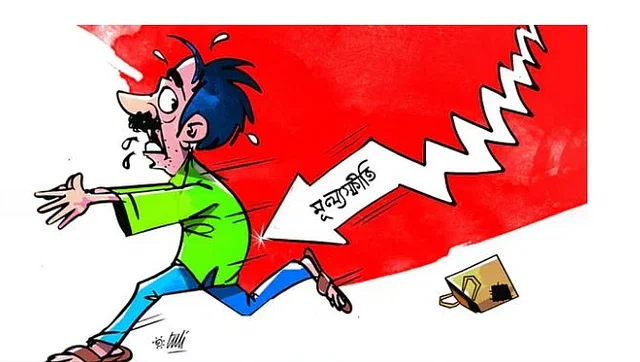
Inflation in the country has reached its highest level in almost a decade. This has been an ongoing problem for over 18 months since the beginning of last year. This is the result of failure to implement necessary measures to curb inflation in time. Although the Ukraine war had an initial impact on inflation, it is not a valid excuse after so long. Other factors, such as two rounds of fuel price hikes during this period, also contributed to inflation. Since fuel oil is essential for almost all sectors of the economy, its price increase affects the cost of most goods and services.
There are three areas where we see significant shortfalls in the fight against inflation. In all three areas there is a deficiency in policy formulation and policy implementation. First, the policy of pegged interest rates at 6% to 9% was maintained until the new monetary policy was announced in June this year. This policy was not compatible with market economy.
In other developing countries like India, Indonesia, Vietnam, Sri Lanka, when inflation was high, they did not peg their interest rates. They used monetary policy more prudently and reduced the money supply in the market by raising interest rates. Bangladesh Bank failed to do this. Even steps taken to introduce a timely interest rate regime under Bangladesh Bank’s latest monetary policy were insufficient. Despite the removal of the interest rate cap, recent monetary policy has remained ineffective in tackling inflation.
The government also contributed to inflation by borrowing heavily from the central bank, which increased the money supply in the market. Moreover, artificially pegging the dollar exchange rate for several years has backfired. Between the end of last year and the beginning of this year, the rupee has depreciated by 25 to 30 percent in a very short period of time. This sudden and massive devaluation also fueled inflation. Because, it has substantially increased the price of imported goods in the domestic market. Therefore monetary policy was inappropriate and inadequate to control inflation.
Secondly, during this crisis, there was an opportunity to effectively use fiscal policy to control inflation by exempting various taxes on imported goods, but it was not seen that way. However, in view of the 25 to 30 percent devaluation of the rupee, at the same time as the price of goods increased in the world market, the government did not adjust the taxes on many imported goods. Due to this, the prices of many products have increased in the domestic market. Therefore, fiscal policy could not be used effectively to maintain a reasonable price level by reducing taxes and providing tax exemptions where necessary for imported goods in the domestic market.
Third, internal market management and market monitoring are poorly managed. As a result, the domestic market has been chaotic everywhere in recent times. Some unscrupulous traders take advantage of the crisis by creating artificial shortages and increase the prices of goods abnormally without any justification. No effective measures have been found to prevent such market manipulation.
Unlike Bangladesh, Sri Lanka has been successful in controlling inflationary pressures. Sri Lanka has faced dire circumstances in the last two years, but is recovering from them. One of the main reasons for this is the independent role played by the Central Bank of Sri Lanka during the crisis. The Central Bank of Sri Lanka independently controls interest rates and foreign exchange rates without any government intervention. On the other hand, the Central Bank of Bangladesh is not independent in formulating and implementing policies related to interest rates, exchange rates and public debt. Moreover, as discussed earlier, inappropriate fiscal policies and weak market management also contributed to high inflation in Bangladesh.
Real income is reduced by inflation and as a result the purchasing power of the common man decreases. Not only the marginalized but also the lower and middle classes are under extreme pressure due to rising inflation. Many are forced to rely on savings or loans to meet their daily expenses. For many such options are also very limited.
Common people are trying to adapt themselves. Many poor households are cutting back on food spending and buying less expensive and less nutritious foods. The effects of these changes in eating habits and lifestyles can be passed down through generations, with the risk of reducing the productivity of future generations. In this way, the risk of creating malnourished generations in the country increases in the long term. We have seen this happen during the corona pandemic. And now the same is happening due to high inflation.
The government should take some urgent steps to control inflation as a top priority—1. Ensuring adequate supply of daily commodities in the market and timely import of food commodities when needed. 2. Effective use of monetary policy, especially market-based adjustment of interest rates, to reduce the supply of money in the market and prevent inflation. 3. Reassessing fiscal policy and reducing import taxes to reduce prices of imported goods in the domestic market. 4. Bring discipline in market management and take effective legal action against traders who unreasonably increase prices of products. To provide a credible threat to the government against market manipulators by allowing competitive imports in the shortest period of time when commodity prices rise. 5. Effectively monitor the market and ensure free flow of information about demand and supply of consumer goods. The government should have accurate figures of what quantity of goods are required and how much to import. 6. Strengthening relevant government departments (such as the Competition Commission) to monitor commodity prices, which are responsible for monitoring the market and preventing anti-competitive practices by traders in the market.
Remember, inflation cannot be controlled by any single agency or policy. This requires a concerted effort of sound monetary policy, fiscal and sound market management.
● Dr. Salim Raihan. Professor of Economics at Dhaka University and Executive Director of SANEM
